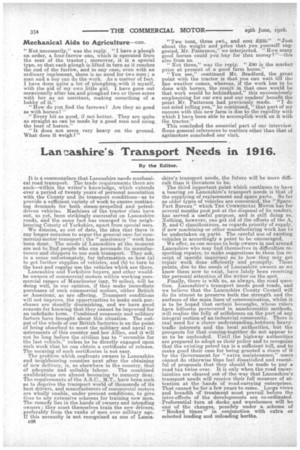Lan rzashire s Transport Needs in 1916.
Page 6

If you've noticed an error in this article please click here to report it so we can fix it.
By the Editor.
It is a commonplace that Lancashire needs mechanical road transport. The trade requirements there are such—within the writer's knowledge, which extends over a period of twenty years of personal association with the County and its transport conditions—as to provide a sufficient variety of work to ensure continuing demands for both steam-propelled and petroldriven vehicles. Machines of the tractor class have not, as yet, been strikingly eucceSsful on Laucashire roads, and the same fact has emerged in the neighbouring County of Yorkshire, apart from special uses.
We dismiss, as out of date, the idea that there is any longer occasion to argue the general case for commercial-motor transport: the " missionary " work has been done. The needs of Lancashire at the moment are not to 'find people who can persuade its manufactOrers and shippers to use such transport. They ask, in a sense unfortunately, for information as how (a) to get further supplies of vehicles, and (b) to turn to the beat and regular use the vehicles which are there. Lancashire and Yorkshire buyers, and other wouldbe owners of commercial-motors within working commercial ranges of Manchester (say, 70 miles), will be doing well, in our opinion, if they make immediate purchases of such commercial motors, either British or American; as are offering. Transport conditions will not improve, the opportunities to make such purchases are steadily diminishing, and we have good reasons for knowing that they cannot be improved for an indefinite term. Combined economic and military factors have brought about this situation. The output of the whole of our British factories is on the point of being absorbed -to meet the military and naval requirements of this country and her Allies, and it will not be long before the civilian has to "scramble for the last vehicle," Unless he be directly engaged upon Such work that he can obtain a certificate of release. The securing of such certificates is not easy.
The problem which confronts owners in Lancashire and neighbouring counties next after the obtaining Of new delivery, is, as elsewhere in the country, that Of adequate and suitable labour. The combined qualifications are almost becoming to memory dear. The requirements of the A.S.C., M.T., have been such as to deprive the transport world of thousands of its beat drivers, and manufacturers of commercial motors are wholly unable, under present conditions, to give time to arly extensive schemes for training new men. The remedy lies in the hands of owners and intending owners ; they must themselves train the new drivers, preferably from the ranks of men over militaryage. If this necessity is not recognized as one of Lanca
shire's transport needs, the future will be more difficult than it threatens to be.
The third important point which continues to have a hearing on Lancashire's transport needs is that of the supplying of replacement and spare parts. So far as older types of vehicles are concerned2 the " SparePart Bureau" which THE COMMERCIAL Momon ha a for several months past put at the disposal of its readers, has served a. useful purpose, and is still doing so. Nothing, however, can get rid of the effects of the A, B, and C classifications, as regards priority of supply, if new machining or other manufacturing work has to be undertaken on porta The careful use of existing vehicles is accordingly a point to be encouraged.
We offer, as one means to help owners in and around Lancashire who may find themselves in difficulties respecting repairs, to make suggestions to them (on receipt of specific inquiries) as to how they may get repair work done efficiently and promptly. These points, due to the needs of Lancashire owners as we know them now to exist, have lately been receiving the personal attention of the writer on the spot.
Finally, there is with us, as always, the read question. Lancashire's transport needs good roads, and we believe that the Lancashire County Council will do its utmost to preserve both the strength and the surfaces of the main lines of communication, whilst, it is to be hoped that certain boroughs, whose rulers have hitherto persevered in ariachrenistic methods, will realize the folly of selfishness on the part of any integral section of an industrial community. There is real need for a closer understanding.between heavytraffic interests and the local authorities, but the prospects for that coming-together do not appear to us to be unclouded. Until the highway authorities are prepared to adopt as their policy and to recognize that the existing petrol tax is a sufficient toll, and to make good their case •for being granted a share of it by the Government for "extra. maintenance," users cannot do otherwise than feel dissatisfied and resentful of proposals that they should be made to pay a road tax twice over. It is only when the road uncertainties are cleared out of the way that Lancashire's transport needs will reeeive their full measure of attention at the hands of road-carrying enterprises. That cannot be for a few years to come. Large views and breadth of treatment must prevail before the inter-effects of the developments are co-ordinated. Preferential turn at docks and warehouses -will be on of the changes, possibly under a scheme of "Booked times" in conjunction with extra, or selected loading and unloading berths.






























